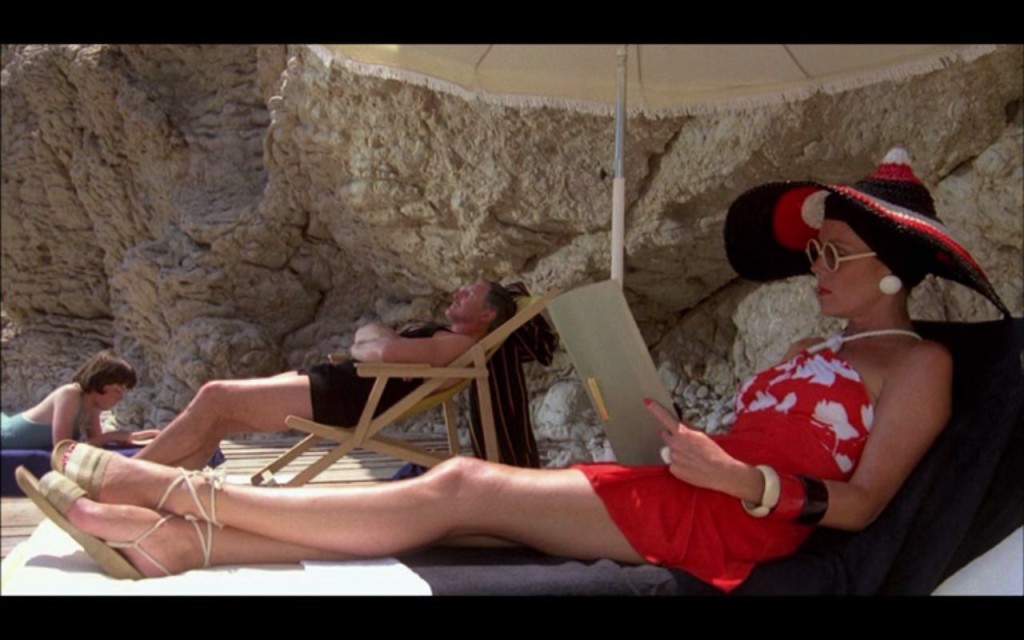 Take an all-star cast, stick them in an exotic location and have one of them drop dead.
Take an all-star cast, stick them in an exotic location and have one of them drop dead.
Voila, you have the basic ingredients of the Lavish Agatha Christie Production, a peculiarly English brand of murder-mystery that in the seventies and early eighties brought us death on a train in Murder on the Orient Express, death on a cruise ship in Death on the Nile, and death on a little island in the Adriatic in Evil Under the Sun.
Millionaire industrialist Sir Horace Blatt (Colin Blakely) is trying to insure an expensive diamond, but the insurance company has doubts and asks famed detective Hercule Poirot (Peter Ustinov) to examine it. Quickly realising it’s a fake, Poirot confronts Blatt, who explains that he bought the diamond for his mistress, actress Arlena Marshall (Diana Rigg). When Arlena left him for another man, Blatt asked her to return the diamond—she must have swapped it for a copy and given him the fake. Blatt really wants his diamond back, so Poirot follows Arlena to an exclusive island resort where everyone knows (and almost everyone loathes) her. There’s gossip columnist Rex Brewster (Roddy McDowall), desperate to publish her biography; Broadway producers Odell and Myra Gardener (James Mason and Sylvia Miles), who want her to star in their show; Daphne Castle (Maggie Smith), a former showgirl turned hotelier who was once Arlena’s rival; and Patrick Redfern (Nicholas Clay), who’s having an affair with Arlena, much to the misery of his wife Christine (Jane Birkin) and Arlena’s husband Kenneth (Denis Quilley). When Arlena inevitably turns up dead, Poirot is faced with a case in which everyone has a motive—and an alibi.
Evil Under the Sun is the cinematic equivalent of a genteel game of Cluedo. Yes, there’s been a death, but it’s a matter best dealt with between friends.
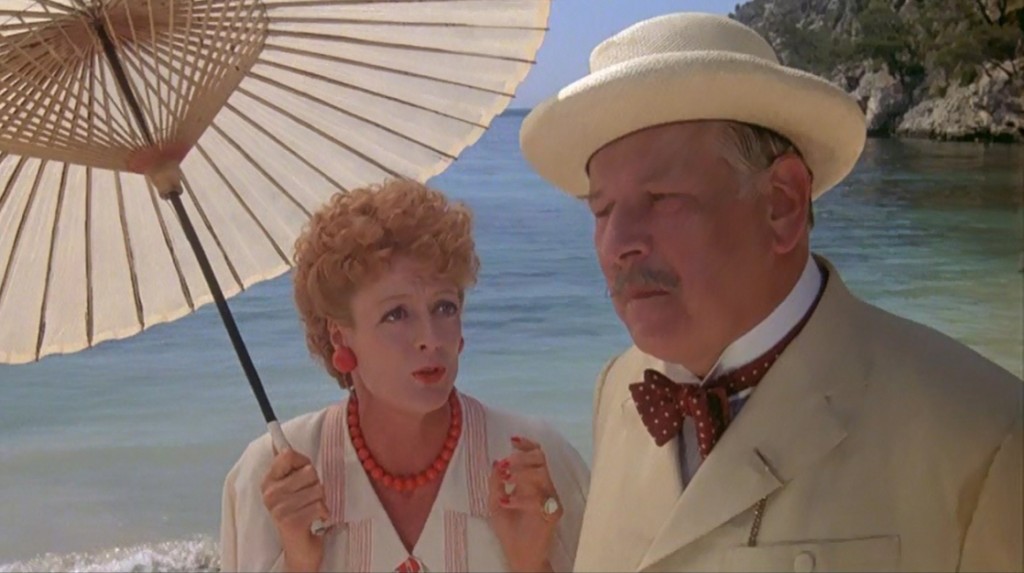 Poirot certainly thinks so. Arch and perpetually amused, with an exasperating air of self-satisfaction, Poirot is an excellent detective and a nigh insufferable human being. Even his investigation is prompted as much by personal vanity as it is by justice. (Why involve the local police? They would simply bungle it.) Arlena calls him an “absurd little man” and she’s not wrong—he laughs at the world’s follies, yet seems blind to his own. Fortunately, Ustinov plays him with tongue firmly in cheek. When we first meet Poirot, he’s at the insurance company, being announced by a prim secretary who mangles his name: “Her-ku-lees Parrot”. “Poirot, madame,” he replies nonchalantly. “Pucker your lips, as if about to bestow a kiss.” Ustinov had already played the detective once before, in Death on the Nile, and would do so several times again. Although he’s far from the definitive Poirot—that honour goes to David Suchet in the marvellous, long-running Granada series—he’s certainly not the worst: the less said about Albert Finney’s screeching, wheezing, inexplicably Oscar-nominated turn in Murder on the Orient Express the better. (Just to clarify: I have a high regard for Albert Finney and absolutely adore him in Tom Jones. But his Poirot makes me wince.)
Poirot certainly thinks so. Arch and perpetually amused, with an exasperating air of self-satisfaction, Poirot is an excellent detective and a nigh insufferable human being. Even his investigation is prompted as much by personal vanity as it is by justice. (Why involve the local police? They would simply bungle it.) Arlena calls him an “absurd little man” and she’s not wrong—he laughs at the world’s follies, yet seems blind to his own. Fortunately, Ustinov plays him with tongue firmly in cheek. When we first meet Poirot, he’s at the insurance company, being announced by a prim secretary who mangles his name: “Her-ku-lees Parrot”. “Poirot, madame,” he replies nonchalantly. “Pucker your lips, as if about to bestow a kiss.” Ustinov had already played the detective once before, in Death on the Nile, and would do so several times again. Although he’s far from the definitive Poirot—that honour goes to David Suchet in the marvellous, long-running Granada series—he’s certainly not the worst: the less said about Albert Finney’s screeching, wheezing, inexplicably Oscar-nominated turn in Murder on the Orient Express the better. (Just to clarify: I have a high regard for Albert Finney and absolutely adore him in Tom Jones. But his Poirot makes me wince.)
Daphne’s hotel is packed with suspects, with varying degrees of screen time, but Rex, Odell and Daphne herself stand out, largely due to wonderful performances by Roddy McDowall, James Mason and Maggie Smith respectively. As Rex, McDowall lounges about in a succession of flamboyant cravats and neckerchiefs, languorously drawing out his vowels and loosing acid-tongued barbs at his fellow guests. He remains impeccably fey and mannered, until another suspect’s casual lie puts his alibi in jeopardy and he begins to panic. The lie is discovered and the liar chastised for nearly getting others into “serious trouble”. “Serious trouble?” Rex shouts, the smooth facade cracking. “Hell darling, you can get them hanged!” Odell, on the other hand, never loses his cool; Mason gives his lines a mordant bite and seems to relish every word. And Maggie Smith, the patron saint of witty dialogue, is tremendous fun as Daphne. “Couldn’t we make this a private investigation?” she asks Poirot. “You know how peculiar people can be about a spot of murder.”
Besides the cast, the main reason to see this film is the sheer style of the production. Everything, from the costumes to the music to the opening credits, radiates elegance. Save two notable exceptions, all the main characters are superbly, if idiosyncratically, dressed and there’s rarely a scene in which their costumes aren’t coordinated. Observe.
John Lanchbery’s shimmering arrangements of Cole Porter standards are a joy (I own the soundtrack) and the watercolours in the opening credits sequence, inspired by the ones Christine paints during the film, cleverly evoke not only the characters, but the crew: costume designer Anthony Powell’s name appears beside a collection of hats; editor Richard Marden’s by a pile of gardening tools, including pruning shears. Also, look out for an Easter Egg that’s hard to spot without the clarity of DVD: a brief glimpse at the hotel guestbook reveals that Daphne’s previous guests included Ivor Novello, Charlie Chaplin, Maurice Chevalier, Marlene Dietrich, Fred and Adele Astaire, and of course, Cole Porter.
Evil Under the Sun is a light, witty whodunit that’s easy on the eyes and ears. Don’t struggle too hard to solve the mystery—just leave it to Poirot and his “little grey cells”.
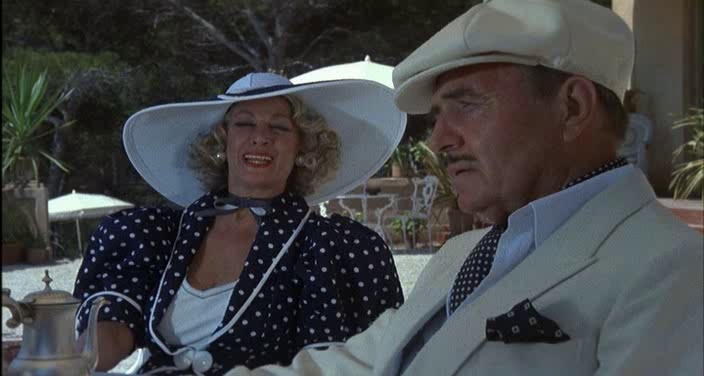
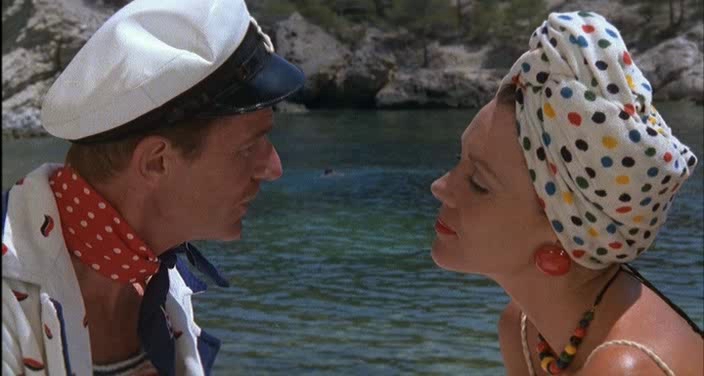
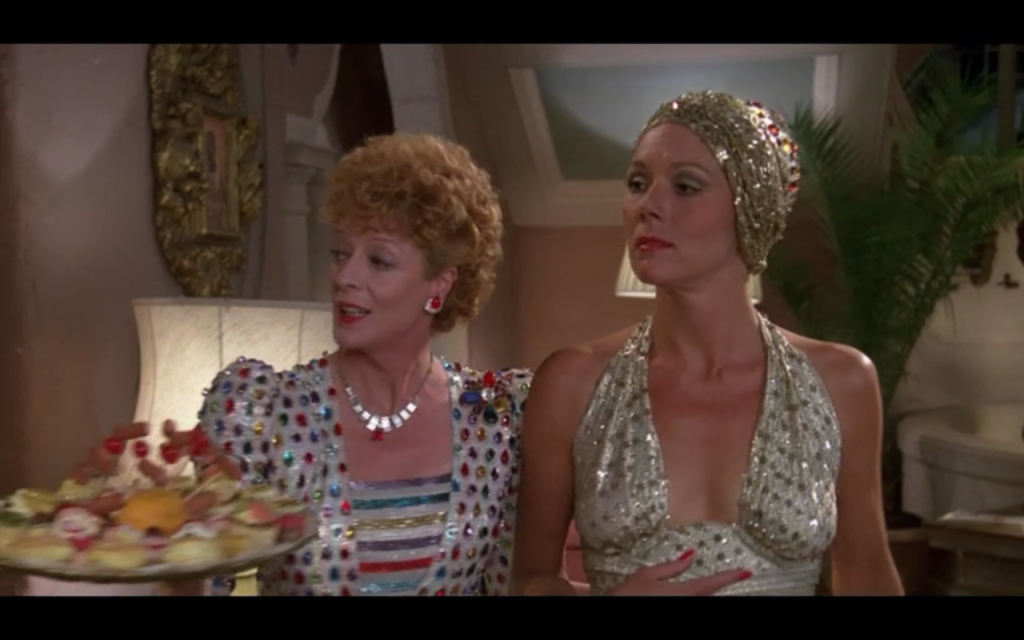
I discovered this movie about 2 years ago when it aired on TCM. I instantly loved it. In fact, I credit this film for starting me off in my mixology hobby as I sought to recreate all of the drinks named at the cocktail party at Daphne’s hotel: sidecar, mainbrace, white lady & between the sheets.
I eventually purchased the DVD and have watched it numerous times. All of the characters are great, the actors did fine jobs in portraying them and the Adriatic island setting fits the storyline so well. In comparing Ustinov’s portrayal in this movie against Suchet’s TV version, I find that I prefer Ustinov. Suchet played the character too seriously and the storyline was too heavy. Ustinov’s humorous, even goofy, portrayal kept his movie light and nicely balanced against the murder aspect of the plot. Ustinov was fun to watch and yet, he maintained enough serious humanity in his portrayal to keep the film from sinking into clownish satire.